Related Research Articles

The Conservative Party Conference (CPC) is a four-day national conference event held by the Conservative Party in the United Kingdom. It takes place every year in October during the British party conference season, when the House of Commons is usually in recess. The event's location has alternated between Birmingham's International Convention Centre (ICC) and Manchester's Central Convention Complex since 2008. Previously, it had alternated between Blackpool, Bournemouth and Brighton. In contrast to the Liberal Democrat Conference, where every party member attending its Conference, either in-person or online, has the right to vote on party policy, under a one member, one vote system, or the Labour Party Conference, where 50% of votes are allocated to affiliated organisations, and in which all voting is restricted to nominated representatives, the Conservative Party Conference does not hold votes on party policy.
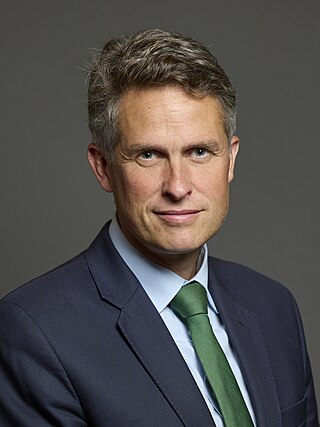
Sir Gavin Alexander Williamson is a British politician who served in various Cabinet positions under Prime Ministers Theresa May, Boris Johnson and Rishi Sunak between 2016 and 2022, lastly as Minister of State without Portfolio from 25 October to 8 November 2022 under Sunak. A member of the Conservative Party, he has been the Member of Parliament (MP) for Stone, Great Wyrley and Penkridge, formerly South Staffordshire, since 2010. Williamson previously served as Government Chief Whip from 2016 to 2017 and Secretary of State for Defence from 2017 to 2019 under May, and as Secretary of State for Education from 2019 to 2021 under Johnson.
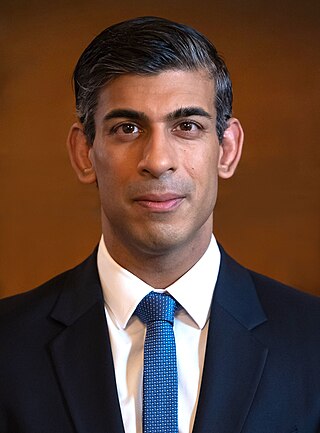
Rishi Sunak is a British politician who served as Prime Minister of the United Kingdom from 2022 to 2024. He has been Leader of the Conservative Party since October 2022; after the general election in July 2024, he became Leader of the Opposition. The first British Asian to hold those offices, he previously held two Cabinet positions under Boris Johnson, latterly as Chancellor of the Exchequer from 2020 to 2022. Sunak has been Member of Parliament (MP) for Richmond and Northallerton, previously Richmond (Yorks), since 2015. He is the most recent Conservative Party prime minister.
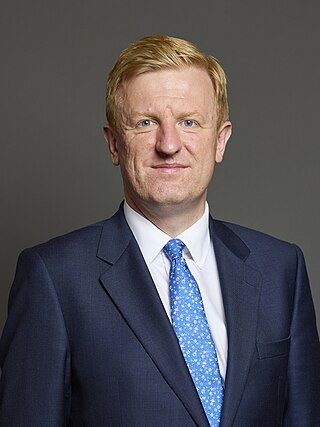
Sir Oliver James Dowden, is a British politician who has been Deputy Leader of the Opposition and Shadow Chancellor of the Duchy of Lancaster since July 2024. He served as Deputy Prime Minister of the United Kingdom and Secretary of State in the Cabinet Office from 2023 to 2024 and as Chancellor of the Duchy of Lancaster from 2022 to 2024. A member of the Conservative Party, he has been the Member of Parliament (MP) for Hertsmere since 2015.

Olukemi Olufunto Adegoke Badenoch is a British-Nigerian politician who has served as Shadow Secretary of State for Housing, Communities and Local Government since 2024 and was Secretary of State for Business and Trade from 2023 to 2024. She was also President of the Board of Trade and Minister for Women and Equalities from 2022 to 2024. A member of the Conservative Party, she served as the Member of Parliament (MP) for Saffron Walden in Essex from 2017 to 2024. In the 2024 general election, she was elected to the new seat of North West Essex.
T Levels are technical-based qualifications in England, developed in collaboration with employers and businesses, with content that meets the needs of industry and prepares students for work, further training, or study.

The 2024 United Kingdom general election was held on Thursday, 4 July 2024, to elect 650 members of Parliament to the House of Commons, the lower house of the Parliament of the United Kingdom. The opposition Labour Party, led by Keir Starmer, defeated the governing Conservative Party, led by Rishi Sunak, in a landslide victory.

Richard John Holden is a British Conservative politician who has been the Member of Parliament (MP) for Basildon and Billericay since 2024. He was previously the Member of Parliament for North West Durham from 2019 to 2024. Holden was the Chairman of the Conservative Party from November 2023 until his resignation on 8 July 2024 following the general election. Holden served as Parliamentary Under Secretary of State for Roads and Local Transport from October 2022 to November 2023 and as Minister without Portfolio from November 2023 to July 2024.

The March 2021 United Kingdom budget, officially known as Protecting the Jobs and Livelihoods of the British People was a budget delivered by Rishi Sunak, the Chancellor of the Exchequer in March 2021. It was expected to be delivered in autumn 2020, but was postponed because of the COVID-19 pandemic. It succeeds the budget held in March 2020, and the summer statement and Winter Economy Plan held in summer and autumn 2020, respectively. The budget is the second under Boris Johnson's government, also the second to be delivered by Sunak and the second since Britain's withdrawal from the European Union. The budget was the first for government expenditure in the United Kingdom to exceed £1 trillion.

Rishi Sunak served as Chancellor of the Exchequer of the United Kingdom from his appointment on 13 February 2020 to his resignation on 5 July 2022. His tenure was dominated by the COVID-19 pandemic in the United Kingdom, with Sunak becoming a prominent figure in the government's response to the pandemic, giving economic support to struggling businesses through various schemes. He was also involved in the government's response to the cost of living crisis, UK energy supply crisis, and global energy crisis.
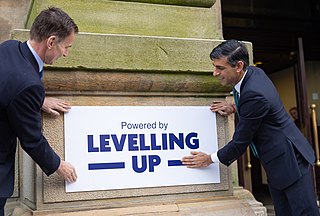
"Levelling up" is a political policy first articulated in the 2019 Conservative Party manifesto that aims to reduce the imbalances, primarily economic, between areas and social groups across the United Kingdom. It seeks to do so without acting to the detriment of prosperous areas, such as much of South East England. A white paper for the policy was published by Boris Johnson's government on 2 February 2022, and was continued by Rishi Sunak's government. The policy was overseen by the Department for Levelling Up, Housing and Communities.
A list of events relating to politics and government in the United Kingdom during 2022.

Liz Truss's tenure as Prime Minister of the United Kingdom began on 6 September 2022 when she accepted an invitation from Elizabeth II to form a government, succeeding Boris Johnson, and ended 49 days later on 25 October upon her resignation. As prime minister, she served simultaneously as First Lord of the Treasury, Minister for the Civil Service, Minister for the Union and Leader of the Conservative Party.

On 23 September 2022, the Chancellor of the Exchequer, Kwasi Kwarteng, delivered a Ministerial Statement entitled "The Growth Plan" to the House of Commons. Widely referred to in the media as a mini-budget, it contained a set of economic policies and tax cuts such as bringing forward the planned cut in the basic rate of income tax from 20% to 19%; abolishing the highest (45%) rate of income tax in England, Wales and Northern Ireland; reversing a plan announced in March 2021 to increase corporation tax from 19% to 25% from April 2023; reversing the April 2022 increase in National Insurance; and cancelling the proposed Health and Social Care Levy. Following widespread negative response to the mini-budget, the planned abolition of the 45% tax rate was reversed 10 days later, while plans to cancel the increase in corporation tax were reversed 21 days later.

The October 2022 Conservative Party leadership election was triggered by Liz Truss's announcement that she would resign as Leader of the Conservative Party and Prime Minister of the United Kingdom, amid an economic and political crisis.

The Sunak ministry began on 25 October 2022 when Rishi Sunak was invited by King Charles III to succeed Liz Truss as prime minister of the United Kingdom. Truss resigned as leader of the Conservative Party the previous day after Sunak was elected unopposed as her successor. The Sunak ministry was formed from the 2019 Parliament of the United Kingdom, as a Conservative majority government. Sunak reshuffled his cabinet twice, first in February 2023 and later in November 2023.

Rishi Sunak's tenure as Prime Minister of the United Kingdom began on 25 October 2022 when he accepted an invitation from King Charles III to form a government, succeeding Liz Truss, and ended upon his resignation on 5 July 2024. He is the first British Indian and the first Hindu to hold the office. His premiership was dominated by the Russian invasion of Ukraine, the Israel-Hamas war, the cost-of-living crisis, and the Rwanda asylum plan. As prime minister, Sunak also served simultaneously as First Lord of the Treasury, Minister for the Civil Service, Minister for the Union and Leader of the Conservative Party.
Amber de Botton is a British journalist and former political aide.
A list of events relating to politics and government in the United Kingdom during 2023.
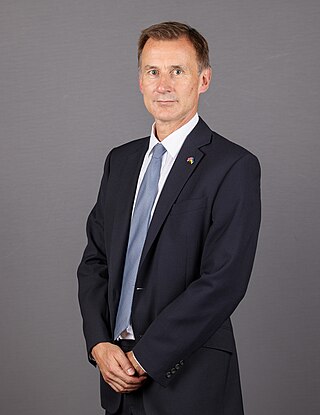
Jeremy Hunt served as Chancellor of the Exchequer between 2022 and 2024, during the premierships of Liz Truss and Rishi Sunak.
References
- ↑ Clarence-Smith, Louisa (2023-10-04). "What is the Advanced British Standard and how is it different to A-Levels?". The Telegraph. ISSN 0307-1235 . Retrieved 2023-10-06.
- 1 2 "A world-class education system: The Advanced British Standard". GOV.UK. Retrieved 2023-10-04.
- ↑ "Sunak axes A-levels and reveals new 'Advanced British Standard'". The Independent. 2023-10-04. Retrieved 2023-10-04.
- ↑ "Advanced British Standard: Sunak qualification will replace A-levels and T-levels". BBC News. 2023-10-04. Retrieved 2023-10-06.
- 1 2 "New qualifications to deliver world class education for all". GOV.UK. Retrieved 2023-10-04.
- 1 2 Adams, Richard (2023-09-22). "Rishi Sunak's A-level overhaul plan is undeliverable gimmick, says Labour". The Guardian. ISSN 0261-3077 . Retrieved 2023-10-04.
- ↑ Brown, Faye (5 October 2023). "What is the new Advanced British Standard replacing A-Levels?". Sky News. Retrieved 2023-10-06.
- ↑ "Winter fuel payments scrapped for millions of pensioners". BBC News. 2024-07-29. Retrieved 2024-07-29.